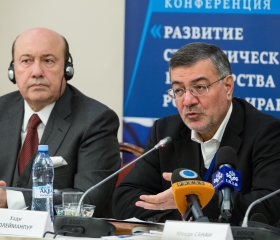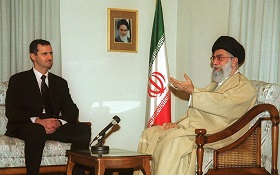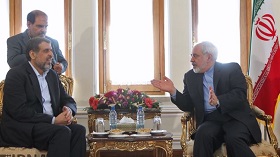Iran’s Regional Policy: A Fresh Start?
(no votes) |
(0 votes) |
PhD in History, expert at the Institute of Strategic Estimates and Analysis, Assistant Professor at the Higher School of Economics
The time seems to have come to note that, after several years of emasculation, Iran has begun to progressively strengthen its regional stance thanks to the nuclear deal reached with the six-nations negotiating group (five permanent members of the UN Security Council plus Germany) on November 24, 2013, and the broader changes in regional politics due to the rise of Islamism. By softening its until-recently rigid approach to the nuclear issue, Tehran has alleviated the international embargo, improving its domestic economy and expanding its financial ability to sustain its regional interests.
The time seems to have come to note that, after several years of emasculation, Iran has begun to progressively strengthen its regional stance thanks to the nuclear deal reached with the six-nations negotiating group (five permanent members of the UN Security Council plus Germany) on November 24, 2013 [1], and the broader changes in regional politics due to the rise of Islamism.
By softening its until-recently rigid approach to the nuclear issue, Tehran has alleviated the international embargo, improving its domestic economy and expanding its financial ability to sustain its regional interests [2].
The Key Problem – Syria
Syria has, for some time (and especially recently), been Tehran’s main concern in the Middle East, and many of its most intricate maneuvers have been aimed at preserving the Alawite regime. In late 2013, Iranian policymakers rejected any involvement of the Syrian opposition in political dialogue, ostensibly because in spring 2013 the secular opposition fell under the control of Riyadh [3], Tehran’s longtime regional rival.
In early 2014, Montreux hosted Geneva-2, a Syrian conflict resolution conference, to which UN Secretary General Ban Ki-moon invited Iranian representatives, although later the invitation was withdrawn, seemingly under the U.S. pressure [4]. The reason seems to have been in Tehran’s stance on recognizing the Geneva-1 forum, which moved for the creation of a Syrian transitional government that involved the opposition [5]. On the eve of the Montreux conference, Ali Akbar Velayati, an advisor to Iran’s supreme leader, explained that Iran would not agree to a transitional government because “representatives of Syria’s legitimate government and the terrorists sponsored by foreign countries, who have committed crimes against the Syrian people, would be placed at the same table.” [6]
In the absence of any legitimate channels for taking an active role in initiatives to resolve the Syrian conflict, Iran has indicated that no peace plan can be developed without it playing some kind of role. Although through clenched teeth, the United States concedes this fact, with statements along these lines even coming from John Kerry [7]. Washington appears to be gradually modifying its approach to Iran, since the deteriorating environment due to the rise of the Islamists against the backdrop of an escalating Syrian civil war sparks at least partial rapprochement with the influential regional actor.
Tehran is working hard to keep Damascus afloat, and seems to be gaining the upper hand over Saudi Arabia, Qatar, and Turkey who all support the anti-Assad forces [8]. President Bashar Assad is still in office, after holding the first competitive presidential elections since 1963 on June 3 and winning with almost 98 percent of the vote, in the absence of any serious rivals. The opposition remains strong and active, but it is localized in the eastern provinces of Al-Raqqah, Al-Hasakah and Deir ez-Zor, with little threat of mounting an advance on Damascus and other economically vital regions apart from Aleppo.
In the absence of any legitimate channels for taking an active role in initiatives to resolve the Syrian conflict, Iran has indicated that no peace plan can be developed without it playing some kind of role.
There can be no doubt that Tehran’s support of Damascus is not solely diplomatic. Prior to the Montreux conference, Saudi officials insisted that Iranian troops are fighting the opposition in Syrian territory [9]. Sources also indicate Iranian weapons supplies to the Syrian army [10]. Notably, Saudi Arabia was a key opponent to Iran’s invitation to the Montreux forum [11].
Iran and Palestine: Together Again
Another indicator Iran’s renewed vigor on the international stage seems to be its restored relationship with the Palestine national movement. Ties with the Hamas and the Palestine Islamic Jihad were fractured after the Palestinians came out against Assad, but in early 2014 Western media reported [12] that both Tehran and Hamas leaders voiced their willingness to mend and expand their relationship. In fact, Chairman of Hamas Political Bureau Khaled Mashal announced that his organization was eager to see links with Iran return to their pre-war level [13]. The two sides were also motivated by the Israeli Army’s unprecedentedly lengthy and bloody operation in the Gaza Strip. According to Iran’s Rahbar Ali Khamenei, it was the Israeli attack on the Palestinian territory that pushed them to smoothing over the differences. He also appealed to the Islamic world to defend their brothers in the Gaza Strip [14], after which Hezbollah leader Sheikh Hassan Nasrallah followed suit, seemingly under pressure from Tehran [15].
Notably, for over two years the Hamas leadership had been dominated by a Qatar-oriented grouping that included Mr. Mashal [16], who had for long time been resident in Doha. With the situation gradually returning to square one and Hamas looking once again to Tehran, revenge is becoming a reality. At first sight, Iran seems to be pushing Qatar back in their geopolitical rivalry and regaining lost positions. However, this trend may be read differently. Qatar may well be deliberately sharing influence over the Palestinian national movement in order to obtain Iran’s support in their escalating confrontation with the Saudis, whose greater clout is fraught with danger both for Tehran and Doha.
Riyadh has recently squeezed out Doha on all regional platforms (Syria, Egypt and Libya) and de facto deprived the al-Thani royal family of any chance to reap the fruits of the Arab Spring. To this end, Doha is in need of a powerful regional ally able to counter the Saudis politically and militarily, and Iran appears the best candidate to fill the gap. Qatar is historically more loyal to Iran than Saudi Arabia, which views the Shiite heretics as its natural foe both in the region and in power struggle within the entire Islamic world.
In early 2013, Iranian Foreign Minister Javad Zarif visited Beirut to meet with Ramadan Abdullah, leader of radical Palestinian group Islamic Jihad and, Iranian media reported, to discuss the worsening situation in Lebanon, where the main ethnic and confessional groups are becoming increasingly polarized against the backdrop of events in Syria [17].
Sunni and Shiite: Battleground Iraq
Qatar may well be deliberately sharing influence over the Palestinian national movement in order to obtain Iran’s support in their escalating confrontation with the Saudis.
After its partial return to the international forefront, Iran has once again started annoying Riyadh through making repeated claims for leadership in the Islamic world. In summer 2014, Chairman of the Expediency Discernment Council Hashemi Rafsanjani met with prominent Muslim scholars and political leaders from Iranian Sunni communities, having declared in his welcome address that Iran would not differentiate between Sunni and Shiite and is ready to protect the rights of all Muslims, irrespective of the confession [18].
The Sunni radicals responded to Tehran's newfound dynamism along the Muslim vector with a series of terrorist attacks against Iranian servicemen and diplomats.
Last February, the Pakistani Islamist group Jaish al-Adl captured five Iranian border guards in the frontier area [19]. After some time, the conflict was resolved through the intervention of eminent Sunni clerics, who persuaded the combatants to release the hostages [20]. Some time before the incident, an act of terrorism had been committed near the Iranian consulate in Peshawar, and last winter a powerful bomb was detonated close to the Iranian cultural center in Beirut, killing five people [21].
These events clearly form part of the continuing latent Sunni-Shiite war that has been shaping the Middle Eastern politics for several decades. And now the main theater for this confrontation lies in Iraq, whose western and central regions have become home to the Islamic State (IS), territory claimed by a group of radical Islamists [22].

Elena Suponina:
Shiites and Sunnis: The Danger of Major War
from Syria to Pakistan
Emergence of a major Islamist entity in close proximity to its borders constitutes a direct threat to Iran's national security. Hence, sources suggest, Iranian troops have already entered Iraqi territory to support local Shiite militias [23]. Tehran is keenly aware that the extremists in Central Iraq will never accept the dominance of the Shiites, who risk sharing the terrible fate of the Kurdish Yazidi if IS prevails. The Iranians are also helping Baghdad by supplying weapons, military hardware, equipment and food [24].
At the same time, recent developments in Iraq to a certain extent seem to have been provoked by Iran, which had long been supporting the government of Nuri al-Maliki – a politician known for his shortsighted policies aimed at suppressing Sunni separatism, which did a great deal to destabilize Iraq. Many Sunnis, who had previously opposed the radicals, have switched allegiances after they realized that al-Maliki's centralization effort was essentially a Shiite terror campaign targeted against them [25]. As a result, in summer 2014, when the situation in Iraq was going from bad to worse, Iran shrugged off al-Maliki, and expressed its readiness to work with any other politician elected by the Iraqis [26].
However, the destabilization of Iraq deserves a more sophisticated appraisal. On the one hand, Iran acquired a strong and utterly hostile Islamic entity close to its borders, while on the other – the United States and the West count on its assistance in the struggle against the Islamic State.
After its partial return to the international forefront, Iran has once again started annoying Riyadh through making repeated claims for leadership in the Islamic world.
In the summer and early fall of 2014, Washington approached Tehran with a request to expand cooperation in countering religious extremism, with talks held by Zarif with Deputy Secretary of State William Burns in June [27] and John Kerry on September 21 [28]. Similar cooperation requests to Iran also came from France and Denmark [29]. Tehran has still not given an explicit answer about its involvement in the new antiterrorist coalition, labeling it as a joke and coalition of repentance [30]. Iran's obstinacy seems to be taking root in its awareness that Washington and Brussels need to win it over, and that for the West would then likely be forced to compromise in any future nuclear deal. Last June, Mohammad Nahawandian, the Iranian president's chief of staff, said that as far as the West is concerned Tehran regards the nuclear talks as a test of trust [31].
Some Words about Israel
The relationship between Iran and Israel is a separate issue. Until recently, Tel Aviv had refrained from taking action against Tehran, apparently because of its considerably diminished activity in Palestinian circles. But as soon as Iran began restoring its ties with the Hamas and the Islamic Jihad, the Israelis launched a massive anti-Iranian information campaign.

Trust Building and Common Response to
Regional and Global Challenges
Apart from traditional accusations of plans to build nuclear weapons and condemning the November 2013 nuclear deal with the six-nations group, in spring 2014 Israel announced that Iran was supplying the Palestinians with smart munitions [32], although Tehran, as predicted, rejected the charges [33].
In spring 2014, Israel’s Prime Minister Binyamin Netanyahu and Defense Minister Moshe Ya'alon issued orders to go ahead with preparations for a strike against Iranian nuclear facilities, with the Israeli media reporting extra USD 2.89 billion allocated to the defense forces for a possible operation [34].
Tel Aviv's statement about a future strike lacks plausibility because the overall balance of forces runs against any such scenario. Besides, Tehran and Tel Aviv are in the same boat regarding the threat from IS.
Russia-Iran: A Dim Future
Iran is indisputably on the way out of the sanctions regime and expanding its political clout, with the EU openly displaying interest in cooperation and the United States showing caution.
Washington has long been burdened by its alliance with Riyadh, irreversibly losing the levers of influence due to economic reasons. To this end, the United States requires a new Middle Eastern system of checks and balances to restrain the influential Gulf elites who sponsor the religious extremists. Today's Iran obviously fits this scheme, meaning that its ties with the West are going to grow, to a great extent due to the desire of major energy players to gain access to Iran’s hydrocarbons.
Hence, Russia's assessment of the emerging environment in Iran should not be simplistic. On the one hand, a strong Tehran appears a promising ally in countering the Islamic threat in Syria and Iraq, but on the other, Western appetites for Iranian oil and gas may result in the emergence of a weighty rival in the European gas market.
Hence, Russia is in a position to offer Iran multifaceted military support with the prior coordination of steps with its Western partners who also want to see the Islamic State destroyed. If expanded bilateral cooperation is approved by the international community, Russia could supply Iran with weapons and establish reliable communications between the security services for an exchange of information on the movement of terrorists and monitoring their propaganda projects.
Russia's support for Iran in the struggle against religious extremism may well also have an impact on the overall climate of the bilateral relationship. In this context, it would seem feasible to attempt to soften Tehran's position on the status of the Caspian Sea. Besides, this rapprochement will definitely expand Russian companies' room for maneuver in the Iranian energy market, which appears of critical importance since key transnational corporations will soon plunge into the scramble for Iranian hydrocarbons.
Last summer, the Iranians mentioned the possible revival of the Nabucco project, intended to deliver gas to Europe. Even minor Iranian participation in the European gas market could generate a tangible threat to Russia, because Iran's gas reserves slightly exceed those of Russia, i.e. 33.8 trillion cubic meters or 18.2 percent of the global figure against 31.3 trillion or 16.8 percent [35].
Now that Iran's economy is unsound, Europe could make Tehran a lucrative offer in order to alleviate its dependence on Russia, which in its turn should do its best and outbid the Europeans by setting out better conditions for the transportation of Iranian gas to potential clients, possibly through reviving the Caspian pipeline project.
1. See: http://top.rbc.ru/politics/24/11/2013/890652.shtml
2. Iran’s economy remains frail. Last April the BBC reported that the government had to cut gas subsidies, as a result of which gas prices shot up 75 percent, hitting the poor and semi-unemployed who comprise 25 percent of Iran’s population (cited by INTERFAX, International News, April 25, 2014, 8:21).
3. Former president of Syrian National Coalition Ahmad Jarba and his successor Hadi al-Bahra maintain close ties with Saudi Arabia, the latter known to have business interests in the kingdom (see: http://en.etilaf.org/coalition-components/general-body/political-committee/other-political-body/hadi-al-bahra.html).
4. INTERFAX, International News, January 21, 2014. 15:57.
5. Iran did not take part in Geneva-1 talks.
6. INTERFAX, International News, January 20, 2014. 22:29.
7. See: INTERFAX, International News, January 22, 2014. 22:41.
8. Of course, the two Arab monarchies and Turkey differ on Syria, with Riyadh and Doha eager to topple Bashar Assad, and Ankara willing only to obtain levers for controlling the situation in Syria that may collapse, threatening stability and integrity of Turkey. According to former U.S. Ambassador in Turkey Francis Ricciardone, Ankara is supporting the moderate Islamists, primarily Jabhat al-Nusra, to use them against the intransigent opposition and the Islamic State. See: The Daily Telegraph. 13 September 2014.
9. INTERFAX, International News, January 20, 2014. 17:18.
10. INTERFAX, International News, February 14, 2013. 21:59.
11. INTERFAX, International News, January 20, 2014. 17:18.
12. http://www.theguardian.com/world/2014/jan/09/hamas-iran-rebuild-ties-falling-out-syria
13. Ibid.
14. http://time.com/3138366/iran-and-hamas-alliance-after-gaza-war/
15. http://america.aljazeera.com/opinions/2014/8/iran-hamas-palestinenuclearnegotiations.html
16. Interview of Khaled Mashal to Shamil Sultanov. http://wordyou.ru/v-mire/rossiya-budet-prirastat-blizhnim-vostokom.html
17. Cited by: INTERFAX, International News, January 13, 2014. 17:35.
18. http://time.com/3138366/iran-and-hamas-alliance-after-gaza-war/
19. INTERFAX, International News, February 17, 2014. 20:01.
20. INTERFAX, International News, April 4, 2014. 17:32.
21. INTERFAX, International News, February 19, 2014. 17:58.
22. This is the latest official title of the Islamic State of Iraq and Levant headed by Abu Bakr al-Baghdadi (real name – Ibrahim al-Badri). See: http://www.bbc.com/news/world-middle-east-27801676
23. http://www.newsazerbaijan.ru/expert/20140624/300562989.html
INTERFAX, International News, June 18, 2014. 12:34.
24. http://www.opendemocracy.net/toby-dodge/resistible-rise-of-nuri-al-maliki
25. http://www.opendemocracy.net/toby-dodge/resistible-rise-of-nuri-al-maliki
26. http://english.alarabiya.net/en/News/middle-east/2014/07/06/Iran-backs-Maliki-as-Iraq-PM-but-prepared-for-change-.html
27. INTERFAX, International News, June 17, 2014. 15:28.
28. http://newsru.co.il/world/22sep2014/vstrecha_702.html
29. http://theiranproject.com/blog/2014/09/17/shamkhani-iran-did-not-accept-denmark%cb%88s-invitation-to-join-us-led-coalition/
30. See: http://www.dailynews.lk/?q=world/anti-isil-coalition-mere-joke-iranian-president
31. INTERFAX, International News, June 18, 2014. 17:55.
32. INTERFAX, International News, March 5, 2014.
33. INTERFAX, International News, March 6, 2014. 9:39.
34. Cited by: INTERFAX, International News, March 19, 2014. 18:33.
35. http://www.bp.com/content/dam/bp/pdf/Energy-economics/statistical-review-2014/BP-statistical-review-of-world-energy-2014-full-report.pdf
(no votes) |
(0 votes) |






